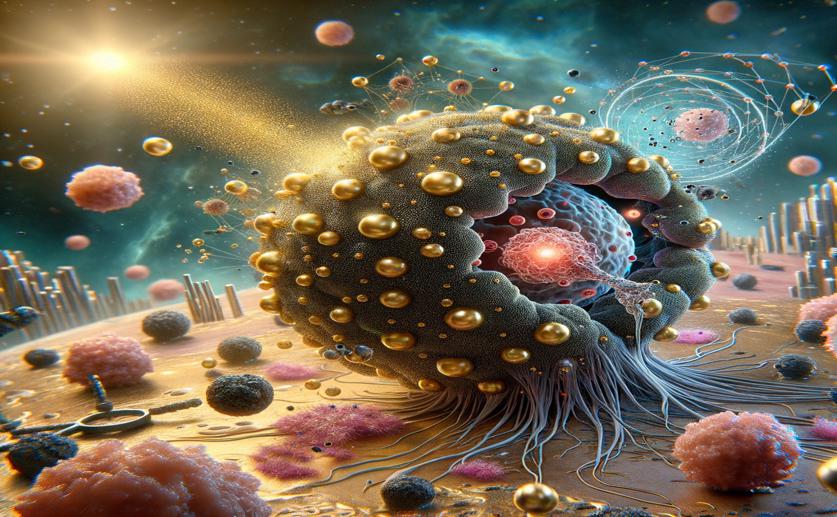Breast Cancer Cell Treatment Using Black Turmeric Extract and Gold Nanoparticles

Image Source: Natural Science News, 2024
Key Findings
- The study by Arya Vidyapeeth College explored the effects of black turmeric (Curcuma caesia Roxb.) and gold nanoparticles (GNPs) derived from it on breast cancer cells
- Both the crude extract and GNPs showed strong cytotoxicity against breast cancer cell lines, with GNPs being more effective
- The treatment was selective, showing no toxicity to other cell lines, indicating potential for targeted breast cancer therapy
Breast cancer remains one of the most aggressive and deadly cancers affecting women globally. Despite the availability of various medical therapies, the prognosis for many patients remains poor, necessitating the exploration of alternative treatments. Ethnopharmacy, which involves the study of traditional medicines, may offer promising solutions. A recent study conducted by Arya Vidyapeeth College investigates the cytotoxic potential of the rhizome of Curcuma caesia Roxb. (Black turmeric) and gold nanoparticles (GNPs) synthesized from it against breast cancer cell lines[1].
The study utilized an ethanolic extract of the rhizome to evaluate its cytotoxic effects. Additionally, GNPs were synthesized using the same extract and characterized through various techniques such as UV-Vis spectroscopy, Transmission Electron Microscopy (TEM), X-ray diffraction (XRD), Fourier-transform infrared spectroscopy (FTIR), and Thermo gravimetric analysis (TGA). These methods confirmed the successful synthesis and stability of the GNPs.
The MTT assay, a standard test for measuring cell proliferation and cytotoxicity, revealed that the crude extract exhibited strong cytotoxicity against two breast cancer cell lines: MCF-7 (ER+) and MDA-MB-231 (Triple Negative Breast Cancer, TNBC). The IC50 values, which indicate the concentration required to inhibit cell growth by 50%, were 15.70 ± 0.029 µg/mL for MCF-7 and 21.57 ± 0.031 µg/mL for MDA-MB-231. Interestingly, the GNPs synthesized from the extract showed even lower IC50 values of 6.44 ± 0.045 µg/mL for MCF-7 and 5.87 ± 0.031 µg/mL for MDA-MB-231, indicating a higher efficiency of the GNPs compared to the crude extract.
These findings suggest that both the crude rhizome extract and its derived GNPs exhibit selective cytotoxic potential against breast cancer cell lines, particularly the more aggressive TNBC type. Notably, no toxicity was observed in other cell lines such as L929 and HeLa, highlighting the selective nature of the treatment.
The study builds on previous research that has demonstrated the medicinal properties of Curcuma species. For instance, Curcuma caesia Roxb. has been traditionally used in Indian medicine for various ailments and has shown significant antioxidant and antimutagenic activities[2]. Additionally, curcumin, an active compound in Curcuma longa, has been shown to inhibit cell proliferation and induce apoptosis in breast cancer cells, including MDA-MB-231[3][4]. The current study expands on these findings by exploring the potential of Curcuma caesia Roxb. in combination with nanotechnology to enhance its therapeutic effects.
The use of GNPs is particularly noteworthy. Nanoparticles can improve the delivery and efficacy of therapeutic agents by enhancing their stability, bioavailability, and targeted delivery to cancer cells. The successful synthesis and characterization of GNPs in this study indicate that they could serve as a promising vehicle for delivering the active compounds in Curcuma caesia Roxb. to breast cancer cells more effectively.
In conclusion, the research conducted by Arya Vidyapeeth College demonstrates the potential of Curcuma caesia Roxb. rhizome extract and its derived GNPs as selective cytotoxic agents against breast cancer cell lines. The study's findings suggest that these natural products, particularly when enhanced with nanotechnology, could be developed into targeted therapies for breast cancer, offering a new avenue for treatment in a field where novel solutions are urgently needed.
MedicineBiochemPlant Science
References
Main Study
1) Cytotoxic potential of Curcuma caesia rhizome extract and derived gold nanoparticles in targeting breast cancer cell lines.
Published 26th July, 2024
Journal: Scientific reports
Issue: Vol 14, Issue 1, Jul 2024
Related Studies
3) Curcumin inhibits proliferation and migration by increasing the Bax to Bcl-2 ratio and decreasing NF-kappaBp65 expression in breast cancer MDA-MB-231 cells.
Journal: International journal of molecular medicine, Issue: Vol 23, Issue 4, Apr 2009
Related Articles





 17th July, 2024 | Jenn Hoskins
17th July, 2024 | Jenn Hoskins